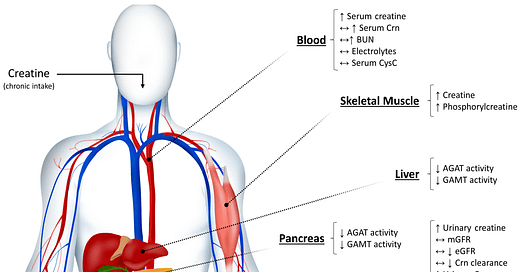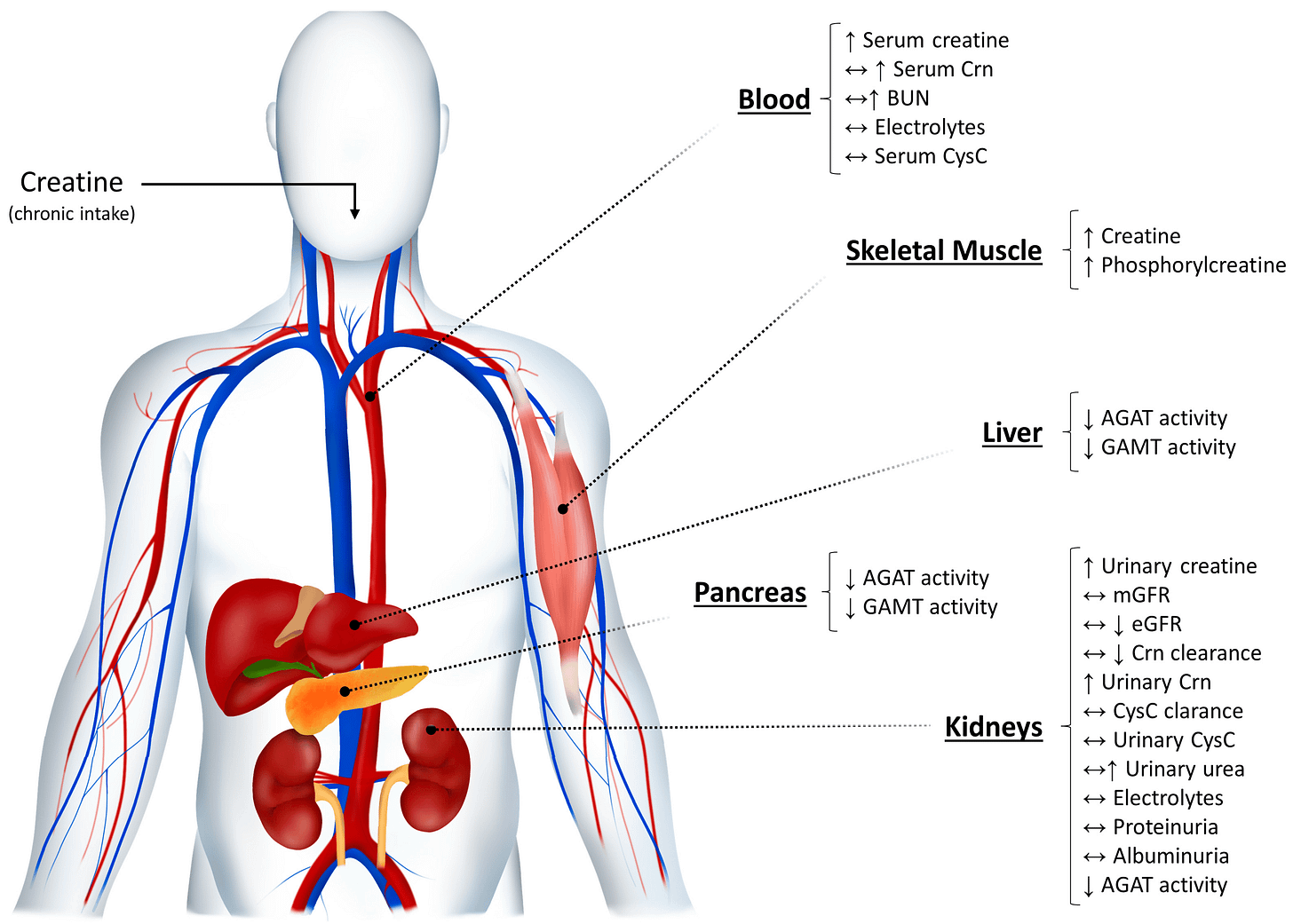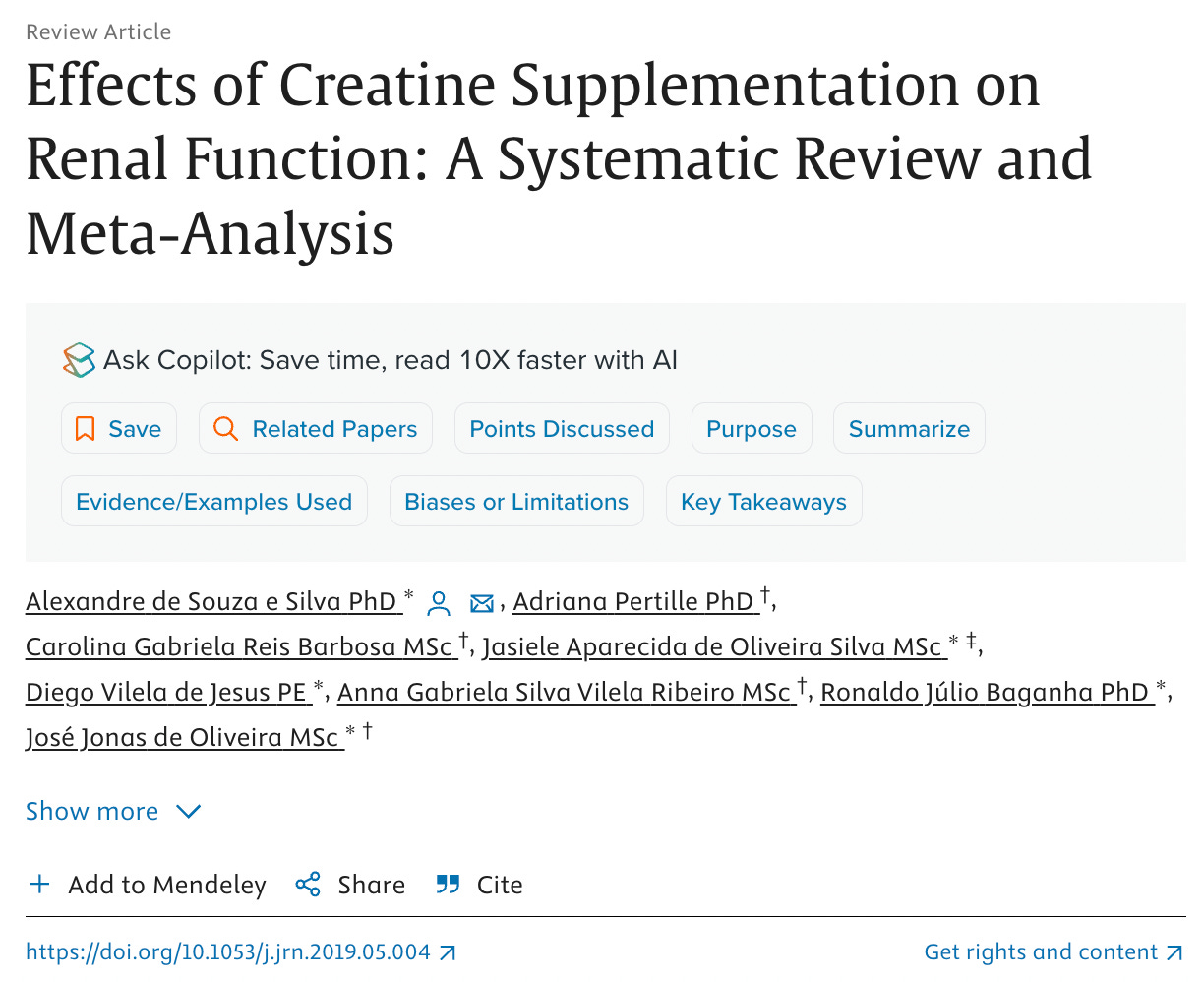Neuro Athletics is a 3x weekly newsletter that breaks down the medical and scientific practises that you need to perform at your peak. Subscribers include professional athletes, athletic trainers, coaches and casual fans. So if you are not already a subscriber, sign up and join 67,000+ others who receive it directly in their inbox each week — it’s free.
Subscribed
Today At A Glance:
Can we please end the myths against creatine causes renal dysfunction? It’s getting a bit old. One of the most significant myths is its alleged detrimental effect on renal function. However over a thousand studies on creatine have consistently reported only one side effect: weight gain, which is likely due to water retention rather than fat. These studies, encompassing a wide demographic from infants to the elderly and spanning up to five years, have shown no serious adverse health risks.
Today’s Newsletter Is Brought To You By MUD\WTR
If you’re looking for a hot beverage without the jitters and the crash, then MUD\WTR is for you. MUD\WTR is a coffee alternative which tastes like a cow and chai had a beautiful baby together.
Packed with four functional mushrooms for targeted benefits, MUD\WTR includes cacao and chai for a mild caffeine kick and chocolatey taste, Lion's Mane for focus, Cordyceps for energy, and Chaga and Reishi for immune support
The best part?
100% USDA Organic, kosher vegan and gluten free, so if you're looking for a delicious alternative to your morning coffee, you can save $29 plus get a free sample of creamer and a free frother!
Neuro Athletes,
I’ve been a huge advocate of creatine for many years now, my understanding of this supplement has been largely shaped by extensive academic research.
For those who need a refresher - creatine plays a vital role in muscle energy production, transforming into phosphocreatine - a key player in ATP production, our cells' primary energy source.
This transformation is catalyzed by the enzyme creatine kinase, which intriguingly requires magnesium to function. My interest in creatine is rooted in its capacity to supercharge energy production, particularly under intense anaerobic activities, thereby enhancing muscle power and performance.
Dispelling the Myths about Creatine
Despite creatine's proven benefits in boosting muscle performance and aiding post-workout muscle recovery, several misconceptions persist. One of the most significant myths is its alleged detrimental effect on renal function. However over a thousand studies on creatine have consistently reported only one side effect: weight gain, which is likely due to water retention rather than fat. These studies, encompassing a wide demographic from infants to the elderly and spanning up to five years, have shown no serious adverse health risks.
Another widespread misconception is creatine's supposed link to hair loss and baldness. This belief stems from a single study on male rugby players, which observed increased serum DHT levels after high-dose creatine use. However, subsequent studies examining creatine's impact on testosterone levels have found minimal or no change in free testosterone levels, the precursor for DHT production. Thus, the initial study's findings have been increasingly questioned, given the lack of evidence supporting a direct link between creatine supplementation and hair loss.
Furthermore, creatine's impact on brain function, particularly in terms of cognitive enhancement and neuroprotection, has also been a subject of interest. While these areas require further exploration, existing studies indicate potential benefits, making creatine a promising supplement not just for physical but also cognitive health.
In my practice, I emphasize the importance of understanding and demystifying these misconceptions. It's crucial to approach creatine supplementation with accurate knowledge and scientific backing, ensuring that its use is both safe and effective.
While my recommendation of 5g/day of creatine monohydrate is grounded in current research and personal experience, I always advise consulting with a healthcare provider before starting any new supplement regimen, especially for individuals with pre-existing health conditions.
The Renal System: A Brief Overview
The renal system, primarily comprising the kidneys, plays a crucial role in maintaining homeostasis. It filters blood, removes waste, balances body fluids, regulates blood pressure, and maintains electrolyte balance. Proper functioning of the renal system is critical for overall health.
Systematic Review and Meta-Analysis: A Closer Look
The first systematic review and meta-analysis aimed to investigate the effects of creatine on renal function was conducted by assessing 290 studies, with 15 included in qualitative and 6 in quantitative analysis.
The meta-analysis showed no significant alteration in serum creatinine levels or plasma urea values, suggesting that creatine supplementation does not induce renal damage in studied amounts and durations.
Understanding the Key Findings
The meta-analysis focused on how creatine supplements affect kidney health, looking specifically at two important indicators: serum creatinine and plasma urea levels.
Serum Creatinine Levels: This is a waste product from creatine in our muscles and is used to check how well kidneys are working. The study found a small increase in serum creatinine levels among those taking creatine supplements compared to those who did not. However, this increase was minor and not enough to be considered harmful to the kidneys.
Plasma Urea Values: Plasma urea is another waste product that kidneys filter out. The study also noted a slight increase in plasma urea levels in those using creatine. But like with serum creatinine, this increase was too small to indicate any kidney problems.
What This Means
These findings are important because they help clear up a common worry about creatine supplements damaging the kidneys. The minor increases seen in serum creatinine and plasma urea levels were not linked to kidney damage. This conclusion is backed by multiple studies, making it a reliable finding.
The Takeaway
This analysis is good news for athletes, gym-goers, and anyone else considering creatine for its health benefits. It tells us that creatine, when used in recommended amounts and for certain periods, is safe for the kidneys. Nonetheless, it's always best for people, especially those with existing kidney issues, to talk to their doctors before starting any supplement, including creatine.
Let me know in the comments below if you take creatine and if you don’t what questions do you have for me?








Hello Louisa - I started taking Creatine but it seems to affect my sleep. I was taking it in the morning after breakfast, so a long time before bed (which is 8:45 - 9pm) any suggestions? Thanks Kindly
Diane
How long can I use it for ? Creatine